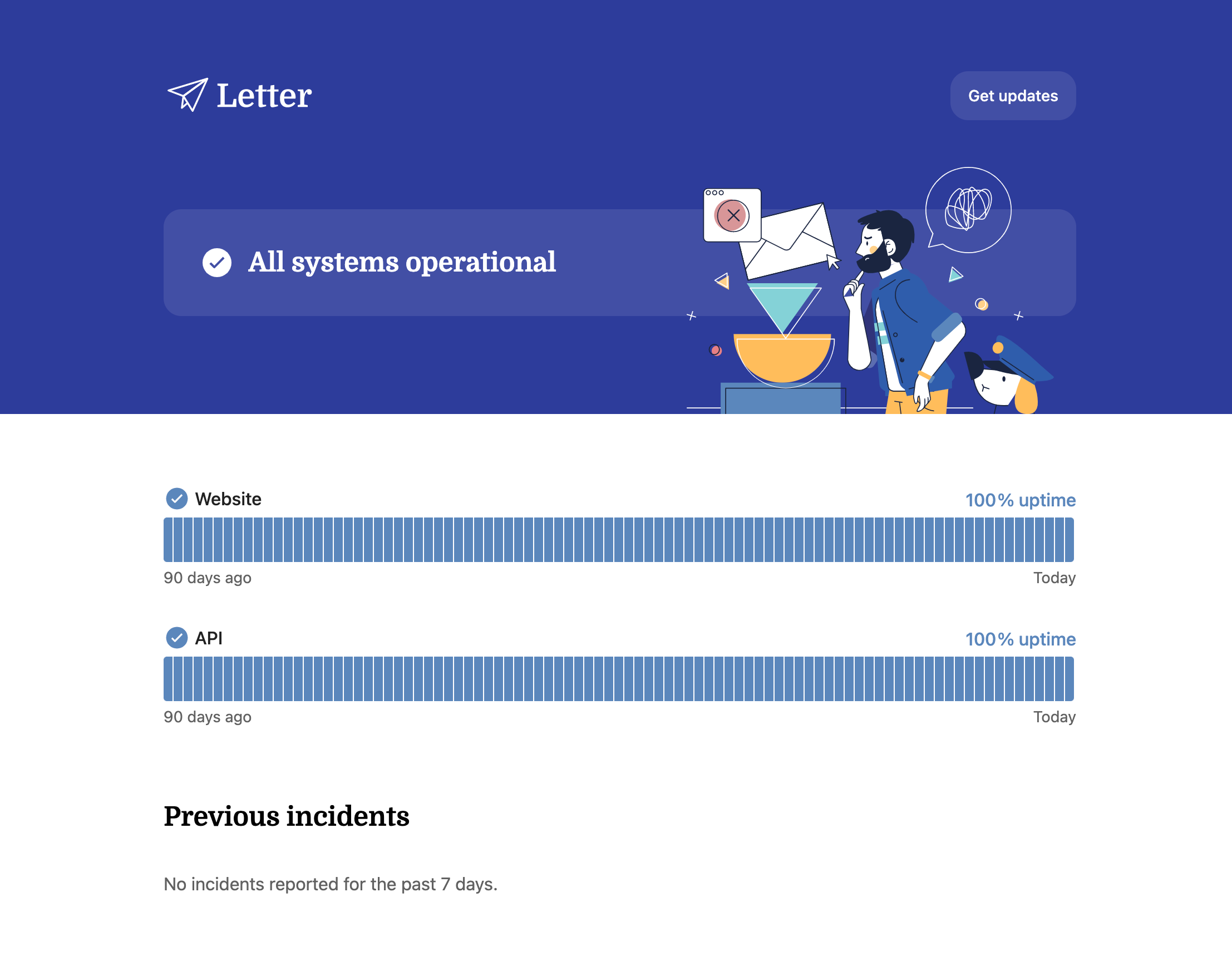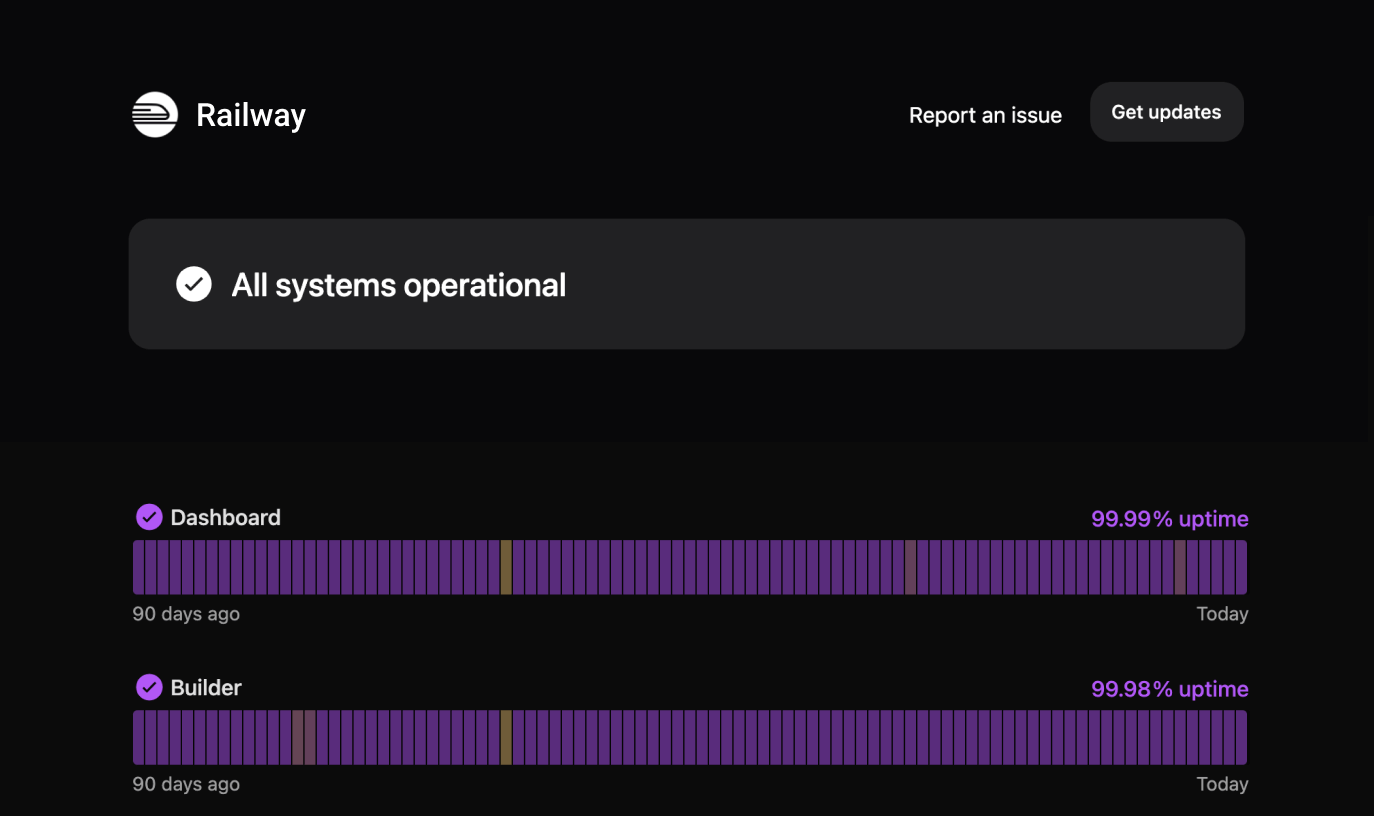The DevOps Career Path: A Complete Guide For 2026

Unlike some trendy career paths that come and go, DevOps is a field that’s here to stay! With the DevOps market expected to grow to an incredible $10.3 billion by the end of 2023, securing a DevOps role is your first step toward a long-lasting career.
And as more and more companies adopt DevOps guides and practices, businesses are delivering software solutions like a well-oiled machine – especially as 99% say DevOps has made a positive impact.
So, if you’re looking for a career that combines cutting-edge technology with creativity, then DevOps may be for you! And in this Instatus guide, we’ll show you how to get your foot in the door in this exciting field.
Let’s go!
What is DevOps?
If you need a refresh, DevOps is a methodology that combines development (Dev) and operations (Ops) in software development, focussing on speed and quality. Investing in a DevOps strategy breaks down silos and **promotes communication and collaboration **between the two.
DevOps is like that one friend who has everything together (yes, you know the one). They’re organized, efficient, and effective.
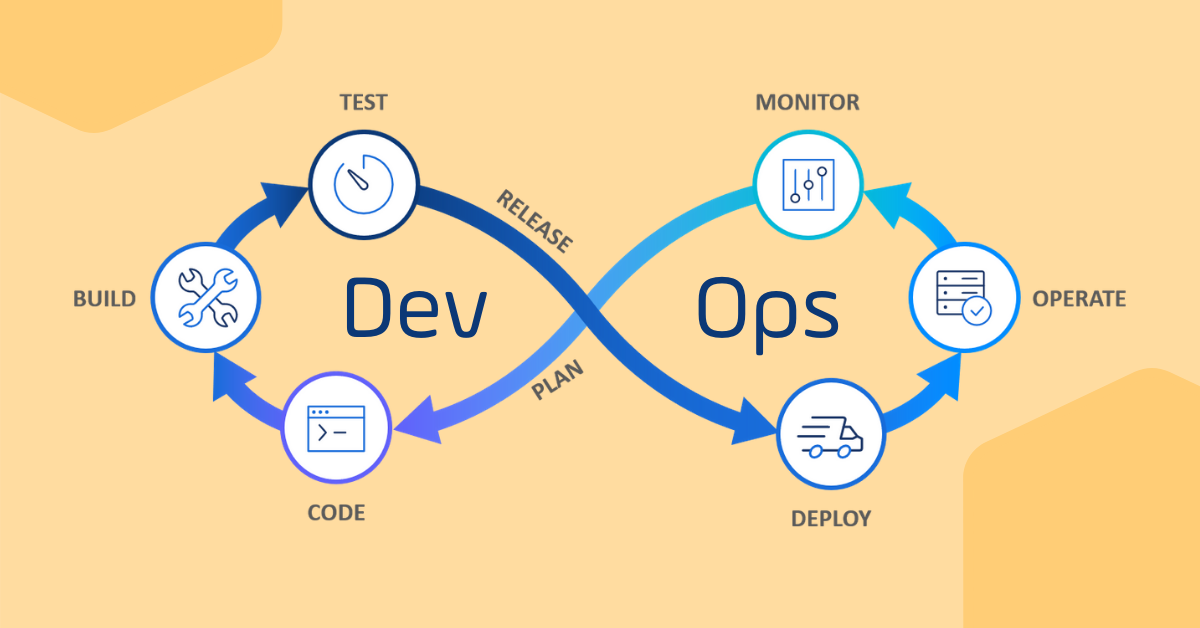
Both teams work together towards a shared goal, with developers bringing their coding expertise as operations professionals use their vast knowledge of infrastructure. It’s a win-win situation that facilitates improved efficiency, faster time-to-market, and more frequent iterations.
What is a DevOps career path?
Within DevOps, you’ll **play a part in the entire software development life cycle – **from initial planning to implementation. Ideally, this means you’ll be a team player with excellent communication skills. So if you consider yourself more of a lone wolf, you may struggle with DevOps’ community spirit.
Normally, working in DevOps starts with an entry-level position like a release manager or Junior DevOps engineer. As you gain experience implementing DevOps tools and processes, you can move into other roles:
- DevOps Engineer
- DevOps Architect
- Reliability Engineer
- System Engineer
Additionally, depending on location and experience, the** average salary for a DevOps engineer in the US is a huge $133,000**.
How planning a DevOps career path can benefit you?
As 86% of organizations believe it’s essential to develop new software quickly, DevOps impacts organizations for the better.
Let’s look at how DevOps benefits you as an employee:
Continuous development
What sets DevOps apart is that you’re part of the process from start to finish. This allows you to identify and refine the skills you need to progress. Since the role is collaborative, you’ll acquire a thorough understanding of the DevOps ecosystem, which will help your progression in the long run.
DevOps demand
If there’s one thing that business owners agree on, it’s that they all want to** increase efficiency and productivity**. That’s precisely why DevOps has become the most used software development methodology worldwide. If you’re looking for a career that’s clearly on an upward trajectory in terms of demand, DevOps is a solid choice.
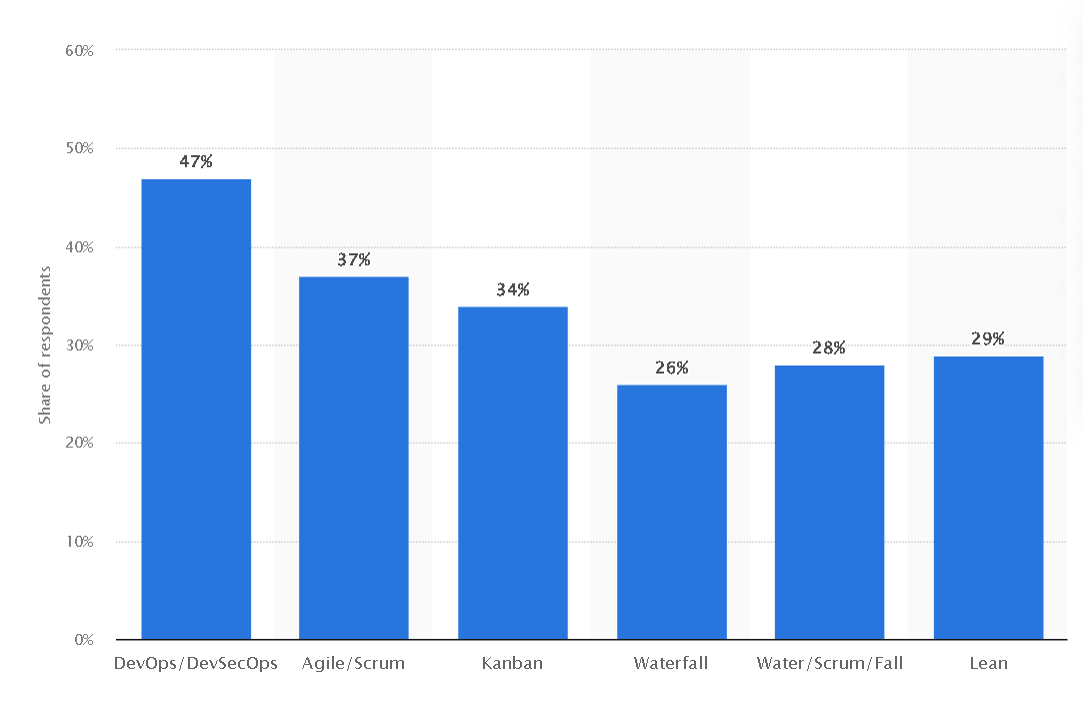
Currently, there are thousands of job opportunities available in the DevOps field, and the demand doesn’t appear to be stopping.
Earning your place in the IT domain
Through a DevOps career, you’ll demonstrate your ability to deliver high-quality software products while balancing the needs of development and operations teams. Not only does this enhance your technical skills, but it also establishes your reputation as an IT guru.
Things to consider before starting a DevOps career
As Dr. Seuss said: “The more that you learn, the more places you’ll go”. That rings true when you’re embarking on a new career.** Don’t begin your DevOps journey in the dark**, consider the following:
- A clear understanding of DevOps: DevOps is not just a set of tools or a job title, it’s a culture shift that emphasizes collaboration, communication, and DevOps automation. It’s best to have a solid grasp of what DevOps entails before making any career plans, as it may not align with your work preferences.
- The technical skills you’ll need: To build a career in DevOps, you’ll need a technical background in computer science or information technology, as well as an understanding of Linux, web development, and Java. Currently, 75% of DevOps engineers hold a bachelor’s degree, while 20% hold a master's.
- Rewarding and diverse tasks: As DevOps covers the whole software life cycle, instead of just focusing on one area, DevOps engineers work on optimizing every step of the process. This means they’ll solve numerous tasks per day, identifying opportunities for improvements along the way.
**Best DevOps career opportunities **
Now that you know what being a part of a DevOps team entails, let’s see if there are any DevOps roles you find appealing:
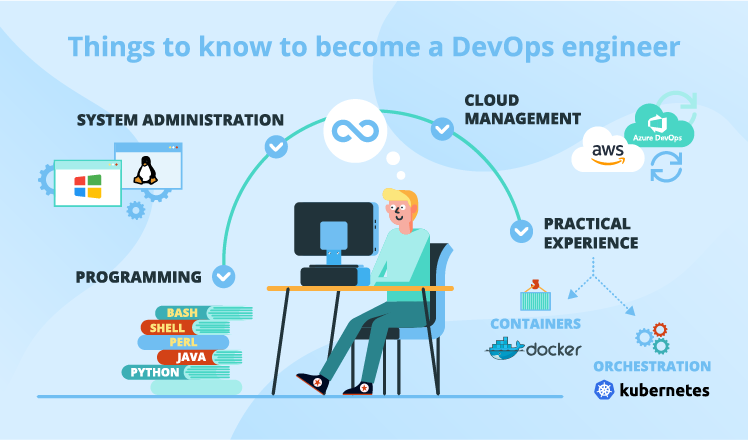
1) Automation Expert
As automation plays such a critical role, every DevOps engineer should be familiar with the automation process. However, some organizations may choose to have a dedicated automation expert or automation engineer on-hand to assist them.
Automation experts specialize in implementing continuous integration (CI) and continuous delivery (CD) within their software lifecycle.
Additionally, they design and integrate monitoring, dashboard, and incident management tools to address any potential errors that may pop up. Automation engineers pride themselves on** streamlining processes, **enabling organizations to release software faster with minimal errors.
As with any process, there are bound to be a few hiccups along the way, what with regular updates and the odd bug fixes. But there’s no need to worry – Instatus has your back.
As soon as a problem is detected, your customized status page is updated and both team members and users are automatically notified via channels you choose. That means less time scrambling to find out what’s happening and more time working on fixes.
2) DevOps Engineer
A DevOps engineer is like a jack-of-all-trades in the IT world, boasting expertise** that covers development and operations**. They help integrate all aspects of the software development lifecycle, from planning and building to testing and deployment.
DevOps engineers work closely with developers to ensure first-rate coding while acting as a bridge between other team members. Because of this, they must possess exceptional communication skills with a strong understanding of system architecture.
3) System Engineer
A system engineer is responsible for designing, deploying, and maintaining an organization’s IT infrastructure, including hardware, software, networking, and storage systems. They monitor system performance and identify areas for improvement, developing strategies to ensure systems run smoothly.
4) DevOps Cloud Engineer
This tech-savvy professional is a maestro in developing cloud-based applications and the infrastructure that powers them. They’re joined at the hip with developers to ensure applications are deployed and operational in a cloud environment.
DevOps cloud engineers are responsible for the ongoing debugging and modification of existing cloud systems, ensuring they remain up-to-date and effective.
5) User Experience (UX) Engineer
A UX engineer specializes in applying UX principles to the development and deployment of DevOps software. This involves working alongside engineering and design teams to fine-tune the user experience.
Responsibilities include conducting user research, creating prototypes to communicate design concepts, and evaluating the usability of software interfaces.
6) DevOps Architect
The DevOps architect is like the contractor of the DevOps world**. They’re responsible for designing and implementing DevOps infrastructure and practices within an organization. By creating an integrated framework that supports CD and automation, they build a solid foundation upon which the entire process rests.
The main goal of a DevOps architect is consistency. They ensure that everything from _development to testing to deployment _is consistent and verifiable. This requires a deep understanding of the tools and technologies found in the software development lifecycle.
So, if you love** building things from the ground up**, the DevOps architect role might be for you.
7) DevOps Lead Engineer
There’s no sugar-coating it, the DevOps lead engineer role is a challenging and exciting position, demanding a unique combination of technical expertise, leadership skills, and a passion for collaboration.
Firstly, they need to be proficient with top DevOps automation tools and have knowledge of cloud platforms like AWS and Google Cloud. Secondly, they're the guiding force behind ensuring teams create and maintain high-quality software applications.
The DevOps lead engineer is responsible for guaranteeing the successful implementation of DevOps processes. If you possess any of the above qualities and enjoy driving collaboration, it’s the perfect fit!
8) DevOps Testing Engineers
A DevOps test engineer is responsible for implementing tests to ensure software products are high-quality, reliable, and scalable. They oversee all stages of the testing process, such as designing automated testing frameworks, identifying and resolving issues, and certifying compliance with industry standards.
9) Security Engineer
Security engineers are in charge of securing digital information, data, and systems from multiple cyber threats (firewalls, antivirus software, etc.). As DevOps companies continue to grow, the role of a security engineer is becoming increasingly important.
It involves conducting risk assessments, vulnerability testing, intrusion detection, and incident response. They also work closely with other IT professionals to ensure that DevOps security protocols integrate well into the infrastructure.
As the role requires highly analytical and strong problem-solving skills, successful candidates should exhibit a thorough understanding of computer networks and operating systems.
10) Release Manager
A DevOps release manager is responsible for managing and overseeing the release of software products throughout the DevOps process. It’s a critical position that verifies products are released on time, with high quality and reliability, while minimizing disruption to end-users.
Embrace a DevOps career with open arms
All in all, the future looks bright for DevOps. As a DevOps professional, you’ll enjoy spectacular career growth filled with endless opportunities. So if you’re ready to “say hello” to DevOps, now is the time!
As you can imagine, no matter what DevOps position you settle upon, streamlining communication is essential, especially as software downtime is common (due to system updates and bug fixes). Thankfully, Instatus can help.
Instatus makes it easy to create beautiful status pages that keep everyone in the know (without having to fork out thousands of dollars). Bring your customers along for your DevOps journey, so they’re never left in the dark.
Get started today and build your amazing status page for free!
Get ready for downtime
Monitor your services
Fix incidents with your team
Share your status with customers

